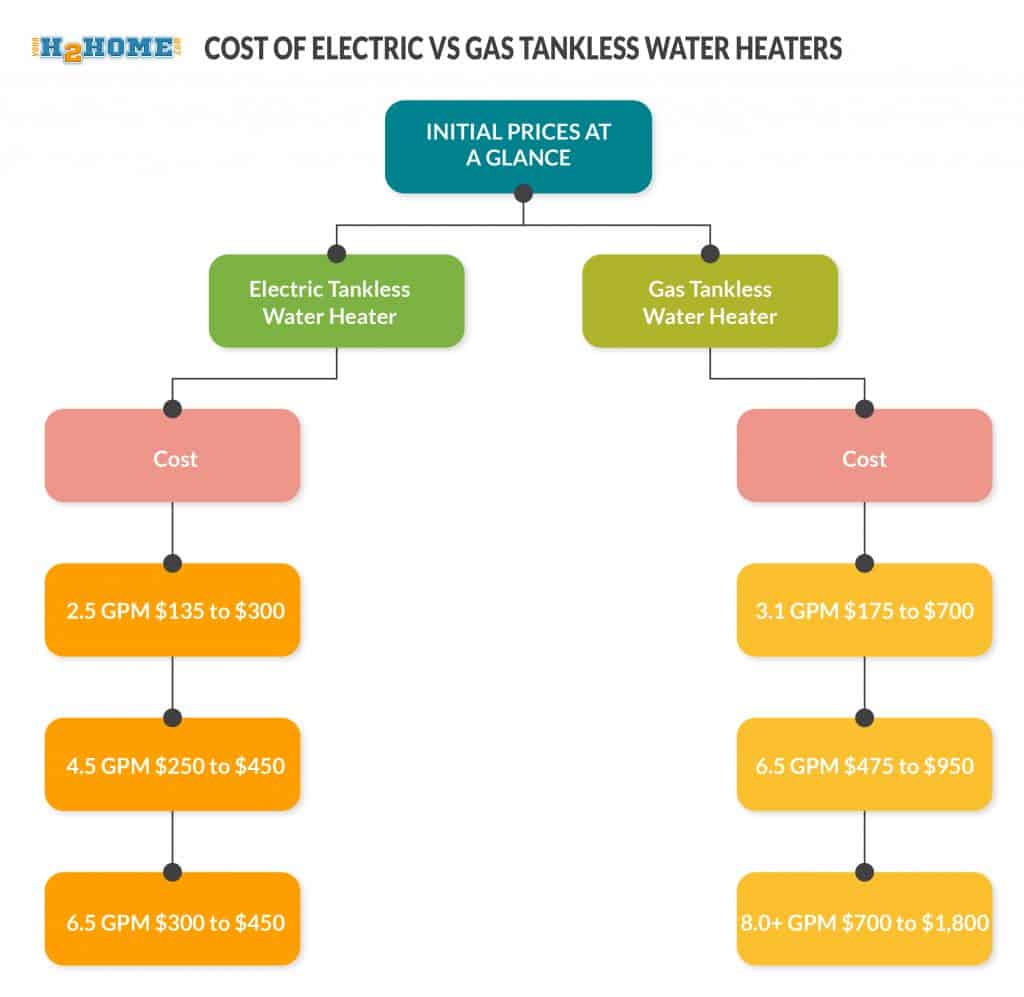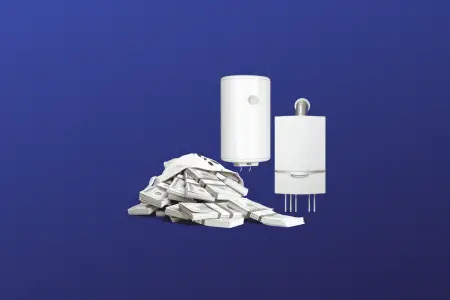When you’re in the market for a new on-demand water heater, then you need to weigh your options.
Gas vs electric tankless water heaters is not easy to figure out at first glance.
Is a gas or electric tankless hot water heater better?
Wrong question.
The better question when asking gas versus electric is which is going to suit your needs best. The best electric tankless water heater may not be good for you just as the best gas one might not be for somebody else.
The way they operate is essentially the same.
Water is heated up when it starts to flow and doesn’t end until you shut it off.
So what is the difference between electric and gas tankless water heaters?
Let’s take a closer look at all the features and ways they differ so you can make an informed decision.
Cost of Electric vs Gas Tankless Water Heaters
Initial Prices At a Glance

As you can see, the question of cost of electric vs gas tankless water heaters is not easy to pin down.
It really depends on your needs. Yes, an electric tankless water heater costs less than a gas one, but the gallons per minute (GPM) is also considerably lower. Electric inline water heaters can’t compete with the output of endless hot water like a gas can.
Yes, a gas tankless water heater is going to cost a lot more than an electric, but you can also supply your whole house with high water demand with a gas tankless and you simply cannot with an electric.
To get a better idea of what a gas tankless water heater can do then you need to go check out this detailed article I wrote reviewing the different sizes for every need by clicking here.
Operating Cost: Gas vs Electric Tankless Water Heater
To determine which is going to cost more to operate per year, you need to figure out what your usage is going to be.
In general, however, it is going to cost more for an electric tankless water heater since electricity costs more. Yearly costs for electric tankless water heaters are still much less than what you would pay when using a tank system.
This is especially true if you are using a lot of hot water. One benefit is that electricity rates are more or less consistent and don’t fluctuate too much.
And in general, gas costs less, but since rates can vary considerably between different regions, the costs do tend to raise more quickly year to year than with respect to electricity rates.
To give an example of how much it will cost to operate an electric tankless water heater vs gas, let’s go with a hypothetical family of four
According to the USGS, a family of 2 adults and 2 children use an average of 70 gallons of hot water per day.
If you’re in the Boston area like I am, then your incoming groundwater temperature is 57°F. If I want to heat the water to 105°F that means I am raising the temperature 48°F.
That converts to about 30,000 BTU on a given day. With the current price of natural gas at $14.71 per 1,000,000 BTU that puts us at roughly $0.41per day using a gas tankless heater.
- A gas tankless water heater cost per year for a family of 4 is roughly $144
By the same metric, an electric tankless water heater will cost roughly $0.11 per kWh which for the equivalent BTU usage for that same family of 4 is $0.96 per day.
- An electric tankless water heater cost per year for a family of 4 is roughly $336
As you can see, that is a significant difference in cost per month.
Obviously, where you live and what your water demand is will determine how much it will actually cost, but no matter how much you use, electric will cost more.
You need to figure out what your water demands are going to be and how many GPM you actually need from a tankless to determine which one will be best. To do this you can read a guide I wrote complete with an easy to use calculator to determine what size tankless water heater you need.

Installation Costs of Gas vs Electric
If you’re going to hire a professional to install your tankless water heater, and you have a budget that you need to stick to, then electric wins this part of the competition.
Connecting an electric to the mains is not very difficult for an electrician to do. In most cases the water lines are the same width and are easy to connect.
Gas tankless water heaters on the other hand require more work. First, there are more safety issues to worry about when it comes to hooking up to the gas lines and meter.
Then, they need to be vented. They can’t just be plugged into any old vent, either. A tankless water heater needs to be vented horizontally so in most cases a hole has to be made in the wall. This adds a bit to the labor costs.
And if it requires a stainless steel vent, then the kit for this can be expensive. Luckily there tankless water heaters that can use PVC which makes for an easier and less expensive installation.
Before you can decide which one is best you need to understand the costs of installation. To learn more about the cost and requirements to in
Do electric water heaters need to be vented?
Luckily, there are no gases emitted so they don’t need a vent. You end up saving on labor costs as well as not needing to pay for a ventilation kit.
Another benefit to not needing a vent is that they can be mounted anywhere. Put it in a closet, under a sink or anywhere else. You can get the water heater closer to where you need it which means less time waiting for the hot water to get to the fixture and you don’t need to use as much piping.
If you feel like you are pretty handy and understand what you are doing then you could do the installation yourself and save some money.
Most tankless water heaters come with very detailed instructions to guide you through the process.
Maintenance Needs and Costs
Contrary to popular belief, tankless water heaters are not maintenance intense.
They do require flushing once a year or so if you live in an area with hard water. This holds true for electric tankless water heaters or gas.
The lime in the water can get encrusted on the heat exchanger. This will eventually cause your output to slow and your unit can eventually fail.
This sounds like a lot of work but it is something that only takes an hour once a year.
So, this comes out to be a push.
The cost to do this yourself is only as much as the flush kit, unless you hire a pro to do it.
Gas tankless water heaters do need to be monitored to make sure the fuel is combusting in a safe manner. This definitely needs to be done by a professional and licensed technician once a year and does add to the maintenance costs.
Electric tankless water heater don’t need this periodic check up so that saves time and money.
Both gas and electric units have water filters that will need to be cleaned out every few months to make sure your water flow is not affected. This is pretty easy to do and only takes a few minutes. If you draw well water then this is especially important to do.
Maintenance of a tankless water heater is not difficult, but there are some things you should know. Namely flushing and descaling. Learn more about it by reading this detailed article I wrote on descaling your tankless water heater.

Which is Better for the Environment?
This one seems to be a bit of a push, as well.
Natural gas doesn’t add as many pollutants to the atmosphere as burning coal or oil, but it does take a toll on the environment when it is extracted through fracking.
Electric does burn coal or natural gas at the source of the power plant when you use any electricity. An electric tankless water heater is very energy efficient so the CO2 that goes into the atmosphere is not really that much. Much less than using a tank system anyway.
If you are eco conscious and try to avoid adding greenhouse gases to the environment, then you can use the endless hot water guilt free with either type of water heater.
Does a Gas or Electric Tankless Water Heater Lasts Longer?
You get a longer life from any type of tankless water heater than with a tank system either way.
You typically get at least 10 to 13 years with an electric water heater. The lifespan of a gas tankless water heater on the other hand lasts at a minimum 12 with most lasting 15 to 20 years.
Even with the high cost of gas on demand water heaters, they still cost less since you don’t need to replace them as often as electric.
Gas water heaters win this round.
So, Which Water Heater Is Better?
Sorry for the cop out answer, but neither one is better than the other.
It really boils down to what your specific needs are and which type best fulfills those needs.
Let’s recap then to see how they compare.
Do you have a big family that uses a lot of hot water?
If yes, then you should get a gas tankless water heater.
Do you live in a cold area with cold groundwater?
If yes, then gas gets the nod.
Is your space limited to where you could install and a vent won’t fit?
If you are limited as to where to place your tankless water heater then you should consider electric since you have more options as to where to install it.
Is natural gas not available in your area?
You’re not necessarily only limited to electric since you could opt for a propane tankless water heater, but you may be better off with electric.
Do you need a tankless water heater for a tiny house, RV or cabin?
You can use either one, but an electric might serve your needs better and give you peace of mind about not having gas lines to worry about when you aren’t there.
If you’ve read this far then you may already understand which is going to work best for you.

Nick Lopresti is the founder of YourH2Home and a home improvement expert. He has years of experience writing about various home improvement topics, mostly as it pertains to water systems.
